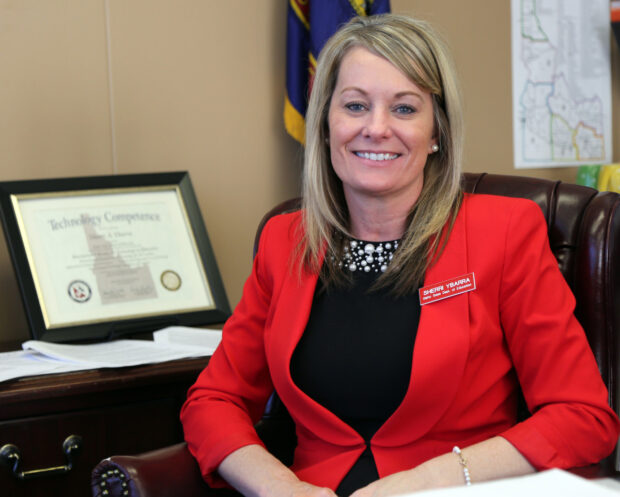The new chief policy officer who is responsible for implementing schools chief Sherri Ybarra’s vision isn’t employed by the State Department of Education.
Instead, Duncan Robb is employed by DePaul Industries, a Portland, Ore.-based temporary employment agency that received a no-bid contract from Ybarra’s State Department of Education.

Robb could not be hired as a full-time employee because Ybarra ran out of money appropriated for salaries. The money used to contract with DePaul Industries and Robb will be pulled from her general fund budget, department spokesman Jeff Church said.
Robb is the only member of Ybarra’s leadership team who works under an arrangement with a temp agency.
According to the contract, obtained by Idaho Education News under a public records request, DePaul receives a $35,250 markup fee from the state on top of Robb’s $100,000 salary this year.
Church emphasized that Ybarra and department leaders are comfortable with DePaul’s contract arrangement and the costs.
Robb is one of the department’s highest paid employees, making roughly what Ybarra earns in a year. He is responsible for working with lawmakers, state officials and education groups to implement Ybarra’s education policy. He also is charged with increasing transparency by making it easier for the public to access and understand what the department is doing to advance its priorities.
Even though DePaul charges the state $35,250 for employment services, DePaul wasn’t responsible for finding Robb during a job search.
In his previous job at Education Delivery Institute, a Washington, D.C. policy implementation group, Robb worked with Ybarra and her leadership team to help develop a strategic plan. Robb told Idaho EdNews last month that he enjoyed visiting Boise to work with the team and that he assumed Ybarra knew he would be interested in the policy adviser’s opening.
Church said the $35,250 covers DePaul’s service fee, five days paid time off, employee paid benefits such as unemployment insurance, workers compensation insurance, federal and social security taxes and payroll fees.
Ybarra’s team posted the ad for the job opening on April 6.
On April 28, Church told EdNews that Ybarra hired Robb, identifying him by name, listing his salary of $100,000 and even providing a color portrait photo. But no contract had been signed at that point. State officials and DePaul agreed to the arrangement on May 5 and Robb signed it on May 7. His contract went into effect July 1, and runs through June 30, 2017.
Robb’s predecessor, former state Sen. Tim Corder, made $108,139 when he left the department unexpectedly in February.
Although Robb replaces Corder, the department didn’t have the salary money for Robb. That’s because the department moved Tim McMurtrey from a contractor position to become Ybarra’s staff deputy superintendent. McMurtrey, Ybarra’s old boss as Mountain Home School District superintendent, earns $50.49 per hour but must take time off every six months to comply with state retirement program benefits, Church said.
DePaul contract’s for Robb is valued at $135,250.44. Church said the cost is “a wash” compared to Corder’s employment package, since the department doesn’t have to provide medical or retirement benefits to Robb.
Another member of Ybarra’s leadership team, community relations officer Chuck Zimmerly, signed a direct contract with the state. No temp agency was involved in the process.
Church said it was necessary to hire Robb through DePaul, and pay the $35,250 fee. Hiring Robb through the agency provides the state greater flexibility, in hiring for a complex role that may change without notice.
“It is very difficult to ask Duncan in his role to deliver on specific items listed in his contract and not have that flexibility to be agile within his role,” Church said.
The state’s contract with DePaul states that “DePaul remains at all times the ‘employer’ of our associates.” However, Robb is treated like a state employee and works under Chief Deputy Superintendent Pete Koehler’s supervision. Robb has a furnished office next to Ybarra’s. He attends staff meetings and receives an annual evaluation like other state employees. He is eligible to fill out a non-employee reimbursement form to collect travel and per diem expenses, Church said.
“The 35 percent (fee) through the DePaul contract — based on my conversation with the chief financial officer — is not much different than if Duncan were a state employee, considering all that goes into the accrual of state benefits in vacation and sick leave, potential comp time, health care and (retirement) benefits,” Church said. “The administration felt comfortable with the (contract going through) DePaul Services because they provide that flexibility and with the understanding of the cost savings on the FTP side.”
Idaho’s DePaul contract did not go out for public bids
The State Department of Education was able to avoid taking public bids on the DePaul contract because of Idaho code 67-9203 (3b).
Normally, state expenditures for services exceeding $50,000 are subject to “an open competitive sealed bid process.” But as one of the state’s seven constitutional officers, Ybarra is exempt from bidding requirements, Church said.
However, a State Department of Education policy recommends comparing prices or bidding for all purchases.
“It is best practice that cost analysis, price comparisons or bidding be done for all purchases,” the policy says. “The state superintendent may require formal competitive bidding or informal price quoting in purchasing when deemed to be in the best interest of the SDE.”
Idaho Education News policy analyst Randy Schrader contributed research for this report.
